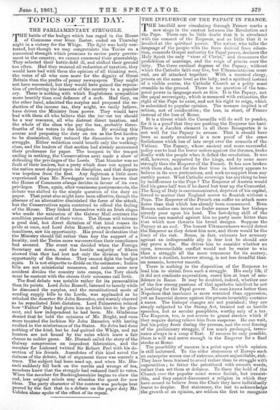TOPICS OF THE DAY.
THE PARLIAMENTARY STRUGGLE.
THE battle of the budget which has raged in the House of Commons ever kince Easter, ended on Thursday night in a victory for the Whigs. The fight was hotly con- tested, but though we may congratulate the Tories on a numerical strength which promises to revive party govern- ment in the country, we cannot commend their generalship. They selected their battle-field ill, and shifted their ground too often. Had they resisted all reduction of taxation, they would have had with them the opinion of all thinking men, the votes of all who care more for the dignity of Great Britain than the profits of penny newspapers. They might not have, succeeded, but they would have gained the reputa- tion of preferring the interests of the country to a popular cry. There is nothing with which Englishmen sympathize more heartily than cool defiance of a mob. Had they, on the other hand, admitted the surplus and proposed the re- duction of the income tax, they might, we- verily believe, have driven the Ministry from power. They would have had with them all who believe that the Mc-me tax should be a war resource, all who distrust direct taxation, and the whole of the class who pay the tax, probably three- fourths of the voters in the kingdom. By avoiding this course and proposing the duty on tea as the first burden to be diminished, they reduced the discussion to a party struggle. Either reduction could benefit only the workine- class, and the leaders of that section had already announced their preference for paper. The tempest in the tea-pot ending in nothing, the Conservatives next made a show of defending the privileges of the Lords. That blunder was no fault of their leaders, but a party which does not appeal to the nation must depend upon its discipline, and that dispute was hopelifs from the first. Any. fugleman a little more experienced than Mr. Newdegate would have known that the House of Commons always decides in favour of its own privileges. Then, again, after wearisome postponements, the debate was shifted to the simple question of the duty on paper. That point also might have been effective, though the absence of an alternative diminished the force of the attack, but the Conservatives again contrived to offend the feeling of the House. They linked themselves with an Irish clique who made the extension of the Galway Mail contract the condition precedent of their votes. The House will tolerate a good deal, but direct dictation of that kind rouses its pride at once, and Lord John Russell, always sensitive to manliness, saw his opportunity. His proud declaration that the Ministry should fall rather than buy the support of a locality, cost the Tories more waverers than their compliance had secured. The event was decided when the Foreign Secretary sat down, and the hostile majority of fifteen showed that they had lost not only the division but the opportunity of the Session. They cannot fight the budget again. It is not etiquette to divide on the estimates ; Indian bills are not ministerial measures, and unless some new accident divides the country into camps, the Tory chiefs must be content with the cheers their sarcasms call forth.
The final debate was notable rather for its personalities than its points. Lord John Russell, listened to tamely while he discussed the surplus, and the constitutional mode of sending supply bills to the Lords, was applauded as he rebuked the deserter Sir John Ramsden, and warmly cheered as he repudiated Irish dictation. Lord Palmerston related how "Father" Daly had given him an Irish hint to be plea- sant, and how independent he had been. Mr. Gladstone denied that he held the opinions of Mr. Bright, and once more taunted the luckless. Sir John Ramsdell with having exulted in the misfortunes of the States. Sir John had done nothing of the kind, but he had quitted the Whigs, and rat bunters are not bound by the rules which leave a fair chance to nobler game. Mr. Disraeli called the story of the Galway compromise an impudent fabrication, and the member for Liskeard twitted Sir Robert Peel with his de- sertion of his friends. Anecdotes of this kind saved the dulness of the debate, but of argument there was scarcely a trace. The subject had been used up, and when Mr. Dis- raeli suddenly fell back on the merits and wrongs of tea, members knew that the struggle had reduced itself to votes. When the member for Buckinghamshire begins to chew the cud, less original minds may abandon the quest for new ideas. The party character of the contest was perhaps best proved by the fact that in a debate on the paper duty Mr. Cobden alone spoke of the effect of its repeal.






























 Previous page
Previous page